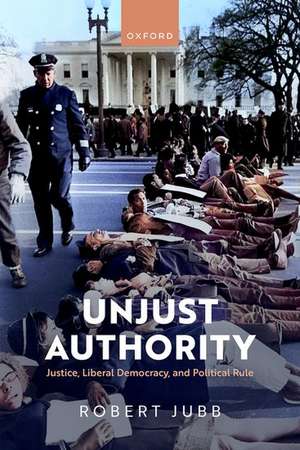Unjust Authority
Autor Robert Jubben Limba Engleză Hardback – 26 dec 2024
Preț: 502.96 lei
Preț vechi: 721.80 lei
-30% Nou
Puncte Express: 754
Preț estimativ în valută:
96.24€ • 102.92$ • 80.24£
96.24€ • 102.92$ • 80.24£
Carte disponibilă
Livrare economică 17-24 martie
Preluare comenzi: 021 569.72.76
Specificații
ISBN-13: 9780198938095
ISBN-10: 0198938098
Pagini: 176
Dimensiuni: 160 x 240 x 15 mm
Greutate: 0.41 kg
Editura: OUP OXFORD
Colecția OUP Oxford
Locul publicării:Oxford, United Kingdom
ISBN-10: 0198938098
Pagini: 176
Dimensiuni: 160 x 240 x 15 mm
Greutate: 0.41 kg
Editura: OUP OXFORD
Colecția OUP Oxford
Locul publicării:Oxford, United Kingdom
Recenzii
Real-world liberal democratic regimes are flawed, but they are less unjust and have more legitimacy than authoritarian illiberal regimes. Yet contemporary theorists, because of their binary thinking about political authority (as being either fully present or absent), cannot even make sense of this simple truth. Rob Jubb's fantastic book remedies this blind spot of political theory. Taking seriously the need to manage conflict and disagreement in society, it articulates an incisive realist theory of political authority which turns away from perfectionist and moralist assessments of regimes that simplify the messy reality of social life. Jubb's realist framework helps better assess the vices of flawed liberal democratic regimes all the while illuminating their virtues. An absolute must-read for political theorists.
A vital contribution from an incisive thinker. Intellectually demanding and richly rewarding, Jubb poses the surprisingly neglected question of how far the undeniably unjust liberal democracies we know and inhabit can legitimately claim authority over us. Resisting any reductive answer to that question, Jubb criticizes accounts based on justice and instead establishes an innovative and insightful framework for reflection on the ethics of political action in the inevitably imperfect conditions of the real world.
Political theorists have tended to treat authority as a single question: On what basis should we treat the state as authoritative? But surely it should matter what sort of state we are considering. Is the authority enjoyed by contemporary Western liberal democratic states the same as Putin's Russia? Jubb's contention in this forcefully argued monograph is that such questions are fundamental to how we should think about authority. Drawing upon recent developments in realist political thought, Jubb contends that our assessments of a state's authority ought to take into consideration the contexts in which it operates. A terrific example of the value of a realist approach to political theory, this book is essential reading for anyone interested in authority today.
A vital contribution from an incisive thinker. Intellectually demanding and richly rewarding, Jubb poses the surprisingly neglected question of how far the undeniably unjust liberal democracies we know and inhabit can legitimately claim authority over us. Resisting any reductive answer to that question, Jubb criticizes accounts based on justice and instead establishes an innovative and insightful framework for reflection on the ethics of political action in the inevitably imperfect conditions of the real world.
Political theorists have tended to treat authority as a single question: On what basis should we treat the state as authoritative? But surely it should matter what sort of state we are considering. Is the authority enjoyed by contemporary Western liberal democratic states the same as Putin's Russia? Jubb's contention in this forcefully argued monograph is that such questions are fundamental to how we should think about authority. Drawing upon recent developments in realist political thought, Jubb contends that our assessments of a state's authority ought to take into consideration the contexts in which it operates. A terrific example of the value of a realist approach to political theory, this book is essential reading for anyone interested in authority today.
Notă biografică
Robert Jubb is an Associate Professor of Political Theory at the University of Reading. He has published on a range of topics in political theory and philosophy, including equality, realism and ideal and nonideal theory, collective responsibility, and protest and resistance. This is his first book.
